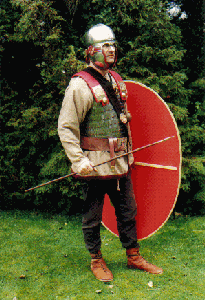Since there was no meaningful difference in how the Christian and non-Christian barbarians acted, why should it have affected the Roman Empire any differently?
And again, if Christianity was so bad for the West, why did it work for the East where there was a far stronger hellenistic tradition?
Dude, I think this would be a good point for you to go back and read my initial post.
Done that? Good. Let's recap.
1) I never said the adoption of religion was what caused the Roman fall in the West.
2) I stated that "some say", not that "Curt says", a major difference there.
3) Kindly do not run with a one-sided debate built on you not reading my post.
We can assume that the presence of established religion did clash with new imported
faiths, but as we seen, Eastern Mitharism did not cause the Roman Army any problems.
Although it did glorify feats of war. Whereas christianity encouraged peaceful action.
If this had a bearing on anything, I cannot (and did not) say.
So do me a favour and stop assuming I said things which I didn't.
Any time you describe what caused Rome to fall, you have to take into account why the East didn't fall, something which you have not been doing.
So, Byzantium and Rome are the same city and culture...?
Huh? You have been asserting that [blank] caused the collapse of Rome, but those issues were present in both the East and the West. I point out that you failed to address why the East survived, but you retorted that they were two separate entities?
Once, again. Please go back and read my post. I made no assertion.
I merely mused about a certain school of thought among some people.
You are running away with yourself in this headlong rush to defend the
Eastern bulwark of the empire. Such a pity you were not there in 1453!
Only if the collapse results from loss of prime agricultural land, foreign invaders settling down creating their own states, economic collapse, and numerous secessions and military coups, could you use this thread.
These things may indeed happen, which you cannot deny. But to compare these
events to the decline of Rome is (I will agree) not always accurate. All things end.
When the societies we know today are gone, we will be long dead and unable to compare our notes, I fear.








